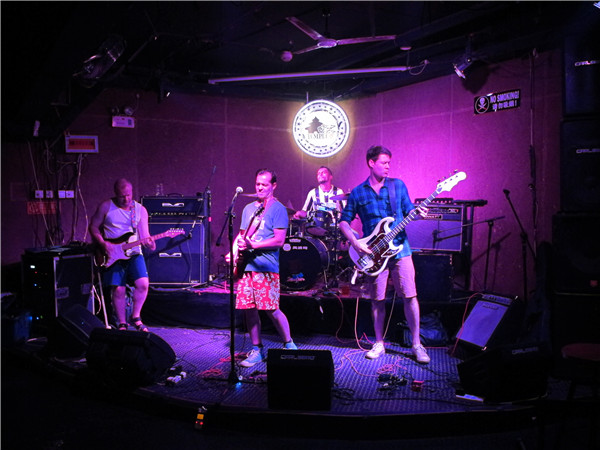 |
|
Black Hipster. [Photo provided to China Daily] |
"But last year I saw a punk band, Brain Failure, on CCTV," Liem says, "It was awesome. Things really are changing."
Josh Feola's take on the changes in rock music in China is slightly different. Feola, 28, a drummer in several bands and a freelance writer for music magazines and websites, says many young bands are now piggybacking on Chinese bands that have preceded them, imitating their style and throwing their own stylistic touches into the mix.
"It's good because five to 10 years ago a Chinese band would imitate a band from the West. Now they're imitating older Chinese bands. Sometimes it's no good if it's complete imitation. But it's good that there is a local example. I think that's healthy in the long run for the music scene."
On a rainy night in mid July, Black Hipster, a blues band, debuted at the Temple Bar. The lead singer is half Spanish and half American, the bass player comes from Australia, the drummer from Azerbaijan and the guitarist from England.
"Today is the day for new bands," said Pink Li, 28, Temple Bar's manager, wearing a camisole, a black punk-style necklace and hot pants.
"That's what we have set Wednesday aside for. After all, all bands, no matter how successful they eventually become, need to start somewhere, and we want to give them a chance to play in front of audiences."
The members of Black Hipster, well out of their 20s and 30s, have played in a lot of bands over the years, and their latest group is less than nine months old. They jumped at the chance to play at the Temple Bar, having played in many other venues, after coming across Li's contact details on the Internet.
"I listened to a demo and felt OK, so I agreed. Why not? We make money from drink, not music. We don't charge bands to perform here. If they are good, they can come back. The Black Hipsters are good."
Dann Gaymer, 28, from Britain, and his girlfriend, have formed a duo called Guiguisuisui (which means sneaky) that plays zombie music.
Performing in China is a lot cheaper than it is in Britain, Gaymer says.
"In Britain you often have to bring all your own (equipment) such as amps and microphones. In some cases you might even need to pay to play."
|
|
|
|
|
|
|
|
